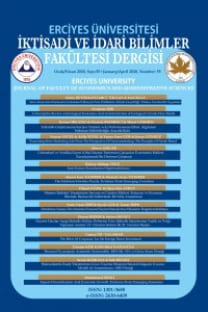Amerika Birleşik Devletleri’ndeki Ermeni Lobisinin Başarısını Etkileyen Faktörler
Amerikan Ermeni lobisi, politika ağı, lobicilik stratejisi
The Factors Affecting The Success of The Armenian Lobby in The United States
Armenian-American lobby, policy network, lobbying strategy,
___
- Baumgartner, F. R. ve Jones, B. D. (1991). Agenda dynamics and policy subsystems. The Journal of Politics, 53(4), 1044-1074.
- Baumgartner, F. R. ve Leech, B. L. (1998). Basic interests: The importance of groups in politics and in political science. Princeton: Princeton University Press.
- Cohen, S. (2019, Ekim 31). Democrat says he voted to recognize Armenian genocide because 'Turkey doesn't seem to respect' US. The Hill. Erişim adresi https://thehill.com/blogs/blog-briefingroom/468405-democrat-says-he-voted-to-recognize-armenian-genocide-because-turkeydoesnt-respect-us.
- Eggen, D. (2010, Mart 4). Armenia-Turkey dispute over genocide label sets off lobbying frenzy. Washington Post. Erişim adresi https://www.washingtonpost.com
- Erhan, Ç. (2019, Kasım 25). Ya birlikte devam edecekler, ya da Türkiye kendi yoluna gidecek…. Takvim Gazetesi. Erişim adresi https://www.takvim.com.tr
- Hojnacki, M. (1997). Interest groups' decisions to join alliances or work alone. American Journal of Political Science, 41(1), 61-87.
- House panel OKs Armenian "Genocide" bill. (2007, 10 Ekim). Retrieved from http://www.cbsnews.com/stories/2007/10/10/world/main3351845.shtml
- Kessler, G. (2007, Ekim 10). White house and Turkey fight bill on Armenia. Washington Post. Erişim adresi https://www.washingtonpost.com
- Ortagus, M. (2019, Aralık 17). Trump administration rejects Senate resolution recognizing Armenian genocide. The Hill. Erişim adresi https://thehill.com/regulation/international/474869-trumpadministration-rejects-senate-resolution-recognizing-armenian.
- Paul, D. M. ve Paul, R. A. (2009). Ethnic lobbies and US foreign policy. Boulder: Lynne Rienner Publishers.
- Peterson, M. A. (1996). Congress in the 1990s: From Iron Triangles to Policy Networks. James A. Morone ve Gary S. Belkin (Eds.). The Politics of Health Care Reform: Lessons from the Past, Prospects for the Future içinde (s. 103-148). Durham: Duke University Press.
- Smith, T. (2000). Foreign attachments: The power of ethnic groups in the making of American foreign policy. Boston: Harvard University Press.
- Türkiye Cumhuriyeti Dışişleri Bakanlığı. (2019, Aralık 12). ABD Senatosu tarafından kabul edilen karar (S. Res. 150) Hk. Erişim adresi http://www.mfa.gov.tr/no_362_-abd-senatosu-tarafindan-kabul-edilenkarar-hk.tr.mfa.
- Türkiye Cumhuriyeti Dışişleri Bakanlığı. (2019, Aralık 12). Ülkemize yaptırımlar uygulanmasını öngören yasa tasarısı S.2641in Senato Dış İlişkiler Komitesinde kabulü Hk. Erişim adresi http://www.mfa.gov.tr/no_358_-ulkemize-yaptirim-uygulanmasini-ongoren-tasarihk.tr.mfa.
- United States Senate. (t.y.). Glossary term/Simple Resolution. Erişim adresi https://www.senate.gov/reference/glossary_term/simple_resolution.htm.
- Vorpagel, N. (2008, Mart). Recognizing the Armenian genocide: The Congressional Foreign Affairs dilemma. Cornell College. Erişim adresi http://www.cornellcollege.edu/politics/courses/allin/364/03R-Nick%20Vorpagel.20083.pdf
- Zarifian, J. (2014). The Armenian-American lobby and its impact on U.S. foreign policy. Society, 51(5), 503-512.
- ISSN: 1301-3688
- Yayın Aralığı: 3
- Başlangıç: 1981
- Yayıncı: -
Hüsni Zaim Darbesi Karşısında Türkiye'nin Suriye Politikası
İpek ÖZENİR, Gülsün NAKIBOĞLU, Pınar ELÇİÇEK GÜNEŞ
Fatma DEMIRCI OREL, Abdil ARIK
Avrupa Birliğinde Çevre Vergisi Gelirlerinin Karşılaştırmalı Analizi
Süleyman DİKMEN, Hüseyin Güçlü ÇİÇEK
Online Platformlarda İçerik Pazarlaması, Yeşil Ürün ve E-Wom Etkileşimi: Ampirik Bir Araştırma
6360 Sayılı Yasa’nın Mali Dönüşüm Etkisi: Denizli ve Uşak İlleri Örneği
Amerika Birleşik Devletleri’ndeki Ermeni Lobisinin Başarısını Etkileyen Faktörler
Uluslararası Ekonomi Politikte Neoklasik Realizme Duyulan İhtiyaç: Avrasya Ekonomi Topluluğu
